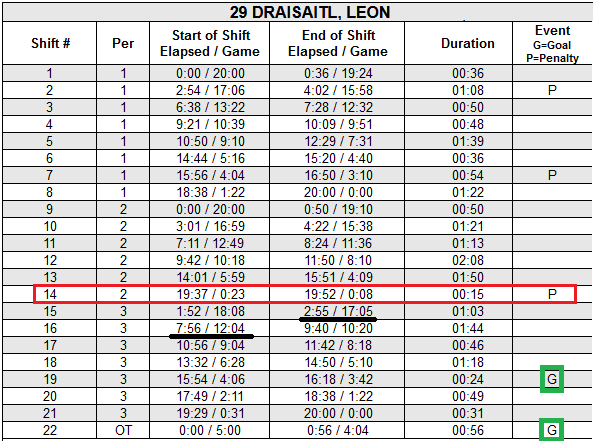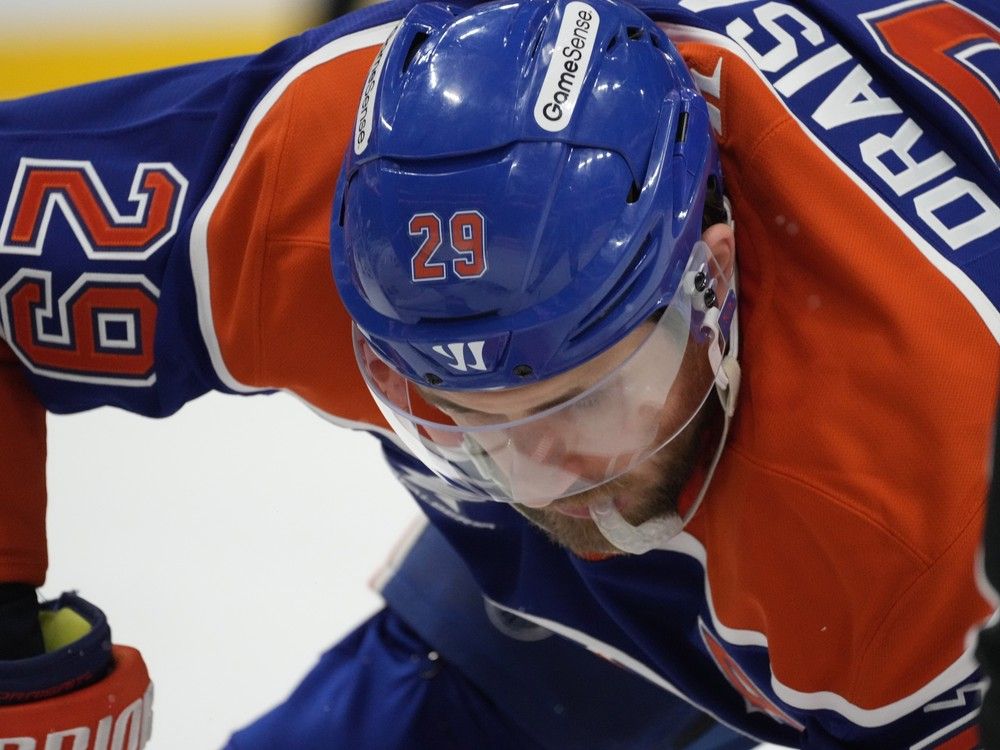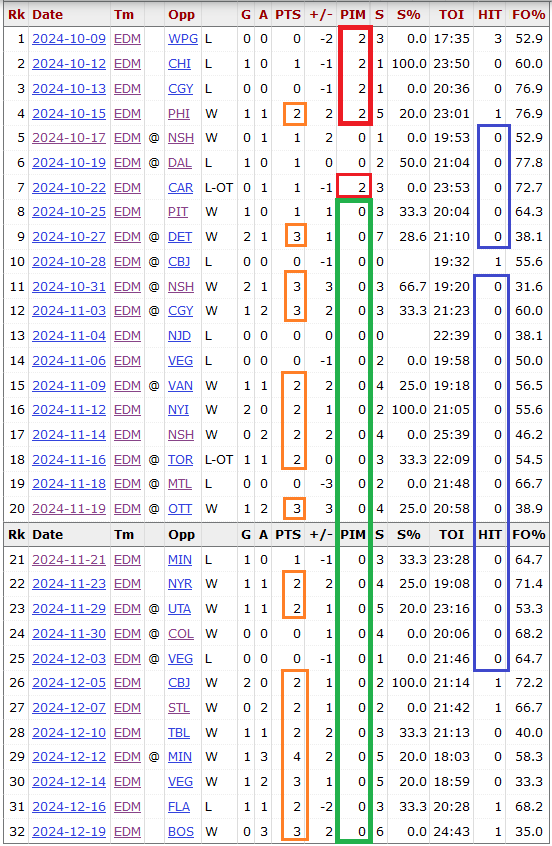It might have been the most consequential 5 minutes of Edmonton Oilers’ season to date. The date was October 15, and the hockey club was in a major funk, leadership group most definitely included.
With just 23 seconds left in the second period, the club gave up a go-ahead goal to the Philadelphia Flyers. Not surprisingly coach Kris Knoblauch sent his newly-reunited power couple of Connor McDavid and Leon Draisaitl over the boards to get it back. But before the period ended, Draisaitl took a petulant penalty for cross-checking Philadelphia grinder Garnet Hathaway, the hockey equivalent of taking coals to Newcastle.
It was already Draisaitl’s fourth penalty of the young season, one in each game. The first two had resulted in powerplay goals for the other team, the third and fourth were selfish stick fouls just before the second Zamboni, each time in a tight game. This against a backdrop of a terrible opening home stand that saw the squad lose their first 3 games of the season by a combined score of 15 goals to 3. Now they were in danger of losing the fourth, down a goal to start the third period and short-handed to boot.
Apparently Knoblauch had seen enough. History does not record what might have been said in the locker room between periods, but the coach’s actions early in the third period speak for themselves.
After his teammates killed the penalty, Draisaitl emerged from the sin bin with the play in progress, and he played a normal post-PK power shift before returning to the bench. But on the bench he would remain, as McDavid took a 5v5 shift without him, then another. Only when the Oilers drew a penalty midway through that second McDavid shift did the coach put Draisaitl back on the ice for the powerplay.
Total time on bench was 5 minutes and 1 second by one measure, 1½ shifts by another. Just long enough to make Knoblauch’s message loud and clear before returning to the custom of every Oilers coach: relying heavily on his two main men.
From then to the end of the game #29 played like a man possessed. The Oilers didn’t click on that powerplay, but with the clock ticking down below 4 minutes, Draisaitl and McDavid set up Evan Bouchard for the (gorgeous) tying goal. The game carried on into overtime, where they finished the job within a minute, the puck flowing seamlessly from Connor to Leon to the back of the net. Draisaitl was named the game’s first star; more importantly he was singled out by Coach Knoblauch for a team award, replete with appropriate words to take some of the edge off the events that had occurred. It was a delicate moment for the coach, but surely the exact outcome he had been hoping for.
The alert reader might point out “you’re full of it, McCurdy, the 5 consequential minutes of that game started with 4 minutes left in the third period”, during which time the Oilers earned both available points with the tying and winning goals. And you’re not wrong, alert reader; in the moment securing that first win was gigantic. I’m thinking more in the abstract, and in the 20/20 hindsight of what has happened since.
At the time of the short-lived benching, Draisaitl had exactly 1 point in 11 periods, a plus/minus of dash-4 with 8 PiM. Since then? Let Leon’s game log be our guide:
Three columns of interest here, duly highlighted. First and most importantly…
Scoring
That 2-point outburst in the closing minutes represented Draisaitl’s first multi-point game of the season, a feat he has since repeated 17 times. At first they were slow to accumulate, just 2 of them in the opening 10 games at which stage he had “just” 10 points. But since then, wowsa. 16 multi-point games of the subsequent 22, including the last 7 (seven) games in a row. Note how the orange boxes denoting such games have gone from lonely singles to lengthy strings.
The Oilers record in those 18 multi-point games? A cool 16-1-1.
.917 is a mighty fine points percentage for any group of games, no matter how they are (cherry-)picked, but when you factor in that the sample represents over half of his team’s games it’s damned impressive.
Penalties
Most of you are too young to remember Stan Mikita, but I sure do. The Chicago Black Hawks star won his first two Art Ross Trophies in the consecutive seasons 1963-65, during which time his 300 combined PiM were the second most in the entire NHL, just 1 minute fewer than future Oilers coach Ted Green. After a “down” year in which he finished second in scoring behind teammate Bobby Hull, he won two more Art Ross Trophies 1966-68, along with two Harts and — get this — two Lady Byng Trophies for the “player adjudged to have exhibited the best type of sportsmanship and gentlemanly conduct combined with a high standard of playing ability”. Mikita accumulated just 26 PiM over those two seasons, less than 10% of his prior rate. Stan didn’t just turn over a new leaf, it was as if he suddenly transformed from Matthew Tkachuk into Anze Kopitar.
Not saying that Leon Draisaitl is that player — or should I say, “those players” because there were two different Stan Mikita’s — but his penalty log from the current season reflects a major change in approach. His robust style of play earned him 76 minutes in the sin bin a year ago. But after a truculent start in the current campaign, note the change in the penalty column from red boxes to green ones. After running around taking a minor in each of the first four games, he took one more vs. Carolina in Game 7 before embarking on a penalty-free run that currently stands at, wait for it, 25 games!
Which for Draisaitl is a lot of ice time, over 21 minutes per game, nearly 9 hours worth without a single punition. His boxcars over that span have been remarkable indeed:
- 25 GP, 20-24-44, +19, 0 PiM
Over the period in question (Oct 25-present), Draisaitl ranks first in the NHL in goals, points and plus … and tied for last in penalty minutes.
Hits
Not quite as extreme as the sea change in penalties, but a notable change all the same. Draisaitl logged north of 50 hits in each of the last three seasons, including 58 in 81 games last year. 40% of the way through the current season he has just 9, of which 3 came in the season opener. After the Philly game he went on a lengthy run [blue boxes] where he was credited with just a single hit over a 21-game span.
Leon will never be accused of being a shrinking violet; if you want to suggest he’s soft I have some property in Edmonton’s beautiful river valley I’d like to sell you. He’s always been a more physical player when he has the puck than not; he invites contact much more than he initiates it. But he’s taken that dichotomy to another level in 2024-25. He remains one of the game’s preeminent masters at puck protection, and can dish out a wicked reverse hit when the situation arises, such as he one he laid on Nikita Zadorov in the Boston game. But without the puck these days he’s much more apt to play the contain game than to take runs at opponents.
Indeed, this reflects the strategy of the team writ large; Knoblauch’s Oilers have gone from middle of the pack in Hits per 60 a season ago to 32nd in the NHL in that same department. The absence of Evander Kane explains some of it, but there’s more to it than that.
Draisaitl himself sits at the very bottom of the club’s ledger in that category, with a paltry 0.8 hits per 60 on the season and just 0.56 over the most recent 25 games.
One could argue Leon has become the poster boy of the Oilers’ evolving style of play. Don’t run around, don’t take yourself out of the play going for hits, don’t take yourself out of the game with repeated trips to the sin bin. Keep your focus on the play, all 200 feet of it.
Wrapping up
There’s much more that could be said about the superb season Leon Draisaitl has been enjoying. We haven’t even begun to dig into the fancy stats side of things, just simple boxcars and selected other counting stats. We haven’t touched on his versatility, switching from centre with a pair of inexpensive depth wingers, or playing (either) wing himself with the game’s most evolved player.
But we do make the case Draisaitl’s season changed abruptly in that Philly game back on Oct 15. Credit to the young coach in his first full season on the job who showed the courage to briefly but pointedly discipline one of the top stars on his team, and the wisdom to pull back as soon as that point was made. Also full credit to the eleven-year veteran who responded to that challenge in the best way possible, both in the moment and from that day forward, with a sustained display of outstanding hockey.
Recently at the Cult of Hockey
STAPLES: Top pairing in flux — Nurse in, Ekholm out
LEAVINS: Player grades in comeback win over Boston
STAPLES: A study of oft-criticized Oilers D-man Evan Bouchard
McCURDY: Digging into Oilers’ improving depth scoring
STAPLES: Player grades in loss to Florida
McCURDY: Are Oilers great or lucky or both?


and on Bluesky Social @brucemccurdy.bsky.social
Follow me on X-Twitter @BruceMcCurdy
and on Bluesky Social @brucemccurdy.bsky.social


